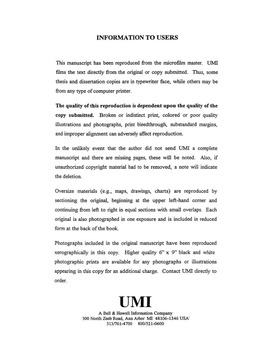| dc.contributor.advisor | Carnevale, David G., | en_US |
| dc.contributor.author | Mareschal, Patrice Marie. | en_US |
| dc.date.accessioned | 2013-08-16T12:30:32Z | |
| dc.date.available | 2013-08-16T12:30:32Z | |
| dc.date.issued | 1999 | en_US |
| dc.identifier.uri | https://hdl.handle.net/11244/5817 | |
| dc.description.abstract | The participant observation portion of my research involved attending the FMCS new mediator training program. This training program consisted of four intensive week-long training sessions. The interview data were derived from 15 semi-structured interviews conducted with the mediators as well as countless informal conversations that took place during the national conference and new mediator training sessions. | en_US |
| dc.description.abstract | I used the data collected from secondary sources, informal networking with dispute resolution professionals, participant observation, and qualitative interviews to develop a written survey. I distributed 185 surveys at the FMCS National Professional Development meeting. I received a total of 78 usable surveys, for a 42% response rate. | en_US |
| dc.description.abstract | The interviews and the participant observation suggested that the parties play a crucial role in the outcome of mediation, but the survey results found no direct effect of the parties on any dependent variable. These results are not as contradictory as they initially appear, as the regression results indicate that the parties exert an indirect effect on mediation outcomes. The participant observation and interview data concurred with the survey results indicating that there is no magic set of techniques and strategies which guarantee success. | en_US |
| dc.description.abstract | Some interesting results derived from the survey data include the following: (1) the "broad" and "narrow" approaches to mediation are complements to each other rather than substitutes for one another; (2) the survey data failed to establish a connection between the mediators' choice of techniques and strategies and the dependent variable of agreement on a contract; (3) the parties are less likely to seek the help of female mediators to improve their ongoing relationship. | en_US |
| dc.description.abstract | My dissertation examines the entire mediation process in the labor relations context to identify the determinants of successful mediation. This research makes several important methodological, theoretical, and practical contributions to the existing body of knowledge of mediation. Secondary data were derived from the Federal Mediation and Conciliation Service's printed documents such as annual reports, task force reports, training manuals, and brochures describing the services provided by the agency. Using these data I was able to infer what factors the agency considers to be critical to mediation success. | en_US |
| dc.format.extent | viii, 300 leaves : | en_US |
| dc.subject | Political Science, Public Administration. | en_US |
| dc.subject | Sociology, Industrial and Labor Relations. | en_US |
| dc.subject | Mediation and conciliation, Industrial. | en_US |
| dc.title | In the eye of the storm: Mediators' perspectives on resolving labor-management conflict. | en_US |
| dc.type | Thesis | en_US |
| dc.thesis.degree | Ph.D. | en_US |
| dc.thesis.degreeDiscipline | Department of Political Science | en_US |
| dc.note | Source: Dissertation Abstracts International, Volume: 60-05, Section: A, page: 1761. | en_US |
| dc.note | Chair: David G. Carnevale. | en_US |
| ou.identifier | (UMI)AAI9930534 | en_US |
| ou.group | College of Arts and Sciences::Department of Political Science | |
